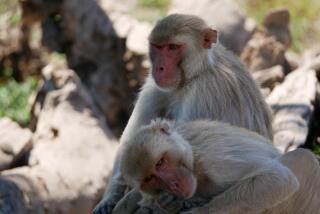Few Birds, Mammals Stay Monogamous, Studies Find
- Share via
WASHINGTON — Only about 10% of the birds and mammals that seem to mate for life are actually faithful to their partners, according to new studies based on genetic testing techniques.
The studies show that even the most apparently devoted of partners often mate around, visiting nearby nests or dens or clans to enjoy the sexual company of strangers. Birds do it, apes do it, and, of course, so do some people, researchers say in reports being published today in the journal Science.
Animal parents may gain important benefits for the future of their species by a little hanky-panky, research shows. A female may stray to pick up the best genes possible for her offspring, experts say, whereas males may be driven by an impulse to father as many and as often as possible.
“True monogamy actually is rare,” said Stephen T. Emlen, an expert on evolutionary behavior at Cornell University. He describes a great difference between “social monogamy,” in which mating pairs bond and work together to raise their young, and “genetic monogamy,” in which parents are faithful sex partners.
Social monogamy is relatively common, but genetic monogamy is the exception rather than the rule, the studies report.
Emlen said among the primates, the animal order that includes humans, only two monkeys--the marmoset and the tamarin--are truly monogamous. All the rest--monkeys, apes and people--often mate outside their partnerships.
Most primates, in fact, make no pretense of faithfully bonding for life, and it is difficult to know for sure that males actually know which of the young in the clan are their children, he said.
Even among humans, one Oregon study has suggested that about 10% of children were not sired by the male partner of the parental pair.
Among the birds, faithful sex partnership has been thought for years to be widespread. Some species, such as the eastern bluebird, gained reputations as shining examples of devotion. Male and female partners work together closely to build nests, incubate eggs, then feed and raise their young.
But Patricia Adair Gowarty, a behavioral ecologist at the University of Georgia, has found that 15% to 20% of chicks cared for by a bonded pair of bluebirds were not fathered by the male. Gowarty reports that of 180 socially monogamous species, only about 10% are sexually faithful.
Several studies have shown that “females socially bonded with very high-quality males do not have copulations outside the pair,” said Emlen.
In effect, such females believe they already have the best, so why look for better?
Impulses that drive humans to seek sex outside their partnership are far more complex.
More to Read
Sign up for Essential California
The most important California stories and recommendations in your inbox every morning.
You may occasionally receive promotional content from the Los Angeles Times.











